
Martha McSally (right) accused Kyrsten Sinema of treason during in their only debate for a U.S. Senate seat in Arizona. (Photos courtesy U.S. House of Representatives)
TEMPE – Political opponents are increasingly trading accusations of treason in hopes of influencing voters, and the tactic just might work, an Arizona State University history professor said Tuesday.
Professor Peter Van Cleave commented a day after Republican Martha McSally flung the word at Democrat Kyrsten Sinema in their only debate in their race for a U.S. Senate seat. Sinema replied that McSally is “engaging in ridiculous attacks and smearing my campaign.”
“The term (treason) does speak to a broader culture we’re seeing of intense political partisanship,” Van Cleave said. “It could have a direct impact on the electorate. It can sway people’s opinions and influence their vote.”
The Constitution defines treason as an act of war against the U.S. or conspiring with the country’s enemies against an ally. The crime is punishable by death.
“Because of the seriousness of treason, you rarely see it brought to bear in the United States,” Van Cleave said. “Even more serious acts in history that you think of that you may consider treason – those were brought as acts of conspiracy, not treason.”
But he said politicians use the word in a moral rather than legal sense.
“It’s another political descriptor of trying to frame your opponent in a specific light,” Van Cleave said.
McSally accused Simena of treason near the end of a debate Monday night on Arizona PBS, based on comments Simena made about the Taliban in a radio interview during the first year of the Iraq War.
“CNN reported that in 2003, while she was on the radio, you said it was OK for Americans to join the Taliban to fight against us,” McSally said. “I want to ask right now whether you’re going to apologize to the veterans and me for saying it’s OK to commit treason?”
As Simena started to respond, McSally, a former combat pilot, interrupted: “It’s treason.”
Sinema said McSally took the 2003 comments out of context and called the treason claim ridiculous.
“The charge of treason,” Van Cleave said, “has a very particular purpose, and the accusation is of a particular kind going back to Sinema’s actions during the Iraq War and opposition to the Iraq War. The charge is not what McSally is after, but the implication.”
Van Cleave said politicians using the term treason as political ammunition date back at least to George Washington, who tried to bludgeon those who criticized him.
“Even in early America, treason was used as a political weapon as much as it’s actually used as a grievance against the state,” he said.
“Treason” was a rallying call during the 2016 election, when some Republicans accused Democratic presidential nominee Hillary Clinton of treason for using her personal email server and mishandling classified emails.
More recently, some Democrats have accused President Donald Trump of treason for his response to the investigation into Russian interference in the 2016 election.
The last time an American was charged with treason was in 1952, when Tomoya Kawakita, a dual Japanese and U.S. citizen, was found guilty of tormenting American POWs during World War II.
President Dwight Eisenhower reduced Kawakita’s punishment from death to life in prison.
Follow us on Instagram.